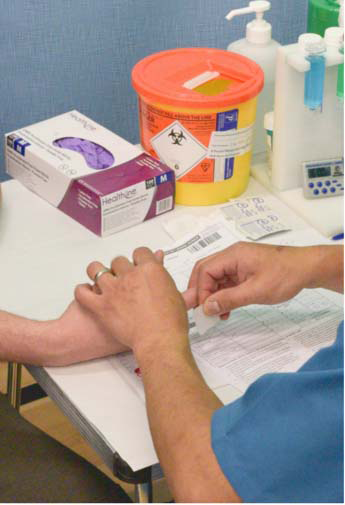New haemoglobin test
Published Autumn 2018
Over the next few months we are rolling out a new way of checking your blood’s haemoglobin levels.
 Haemoglobin (Hb) contains iron and is responsible for carrying oxygen around the body.
Haemoglobin (Hb) contains iron and is responsible for carrying oxygen around the body.
We have traditionally used a copper sulphate test to check your Hb levels are adequate for giving blood, but a more accurate test – a capillary HemoCue – is being offered to donors who may be below the threshold for donation.
The new test removes any ambiguity about your Hb level, meaning that it is safer for you to give blood.
Why might my haemoglobin be low?
A slight decrease in haemoglobin may be normal for some people and does not necessarily indicate an illness: women who are menstruating or pregnant, for example.
A significantly lower Hb count may indicate anaemia or other conditions, and our advice then is to see your GP as soon as possible.
We deliberately set the acceptable lower levels for Hb quite high to make sure that it doesn’t fall to unsafe levels after donation. For men, the cut off is 135g of Hb per litre and for a woman, 125g per litre.
What exactly are these tests?
The copper sulphate test will be very familiar to regular donors and entails us taking a pinprick of blood from your finger and putting it into a vial of the copper sulphate solution. If the blood sinks to the bottom in a set time, you can give blood.
If the blood floats or takes too long to sink, the new capillary HemoCue test will be used. Previously, a venous blood test was used, which meant taking blood directly from a vein – more invasive and time-consuming.
The new test needs just a pinprick of blood from your finger. It’s then checked by a HemoCue machine, which calculates an accurate Hb level. Depending on the results, you will either be deferred or allowed to give blood.
What if I am deferred for low Hb?
If you are deferred, we will ask you not to donate for a while. The length of your deferral will depend on your Hb level and, if it is particularly low, we’ll suggest you visit your GP.
Diet is a good way to raise your Hb levels before you donate again.
Choose foods rich in iron such as:
- pulses and beans
- nuts
- wholemeal grains (brown rice, pasta and bread)
- leafy green vegetables like curly kale, broccoli and spinach
- lean red meats, fish, turkey and chicken
Vitamin C can enhance dietary uptake of iron from the stomach. You can therefore eat foods rich in Vitamin C to help you absorb more iron and thereby improve your haemoglobin level. Vitamin C rich foods includes fresh fruits and vegetables or citrus drinks such as fresh orange juice.
If you can, avoid drinking tea just before, after or with meals as this may reduce the absorption of iron from foods.
